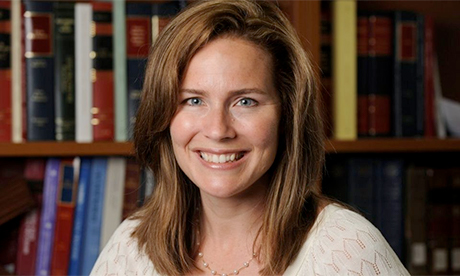Judge Amy Coney Barrett is a wife, mother of seven and a devout Catholic — but how that may affect the presumptive nominee’s potential rulings on the Supreme Court remains to be seen.
Reportedly tapped by President Trump to replace the late US Supreme Court Justice Ruth Ginsburg, the 48-year-old jurist has only sat on the federal bench for three years, after being successfully nominated by Trump to the Chicago-based 7th Circuit Court of Appeals.
She’s written more than 100 decisions and dissents, according to the Chicago Tribune. And while she maintains that her faith does not enter into her rulings on the law, Barrett twice joined with a minority of judges in dissenting opinions that favoured reconsidering rulings that struck down state restrictions on abortion rights.
One case involved an Indiana law that would have required that the parents be notified when minors seek consent for the procedure from the courts, while the other — also passed in Indiana, her home state — banned abortions for reasons related to gender, race or disability, and also required that fetal remains be buried or cremated.
Although the Hoosier State only appealed the decision regarding fetal remains, Barrett and the other dissenters addressed the law’s other provisions, noting that “there is a difference between ‘I don’t want a child’ and ‘I want a child, but only a male,’ or ‘I want only children whose genes predict success in life.’”
“Using abortion to promote eugenic goals is morally and prudentially debatable,” the dissenters argued.
Both of those cases later wound up before the Supreme Court, which reinstated Indiana’s regulation of fetal remains and ordered a reconsideration of its parental-notification law.
The hot-button abortion issue also featured prominently during Barrett’s confirmation hearing for her seat on the 7th Circuit, which reviews rulings from federal district courts in Illinois, Wisconsin and Indiana.
Liberal Democratic senators grilled Barrett — whose children include two adopted from Haiti and one with Down syndrome — on how her religious beliefs might affect her rulings, citing an article she co-wrote in 1998 for the Marquette Law Review that said the Catholic Church’s “prohibitions against abortion and euthanasia (properly defined) are absolute.”
“The dogma lives loudly within you, and that’s of concern when you come to big issues that people have fought for for years in this country,” Sen. Dianne Feinstein (D-California) told Barrett.
But when Sen. Chuck Grassley (R-Iowa) asked when it would be “proper for a judge to put their religious views above applying the law,” Barrett answered, “Never.”
“It’s never appropriate for a judge to impose that judge’s personal convictions, whether they derive from faith or anywhere else, on the law,” she added.
Following the hearing, Barrett was confirmed by the Senate in a near-party-line vote, 55-43.
But her reported membership in People of Praise, an ecumenical Christian community, has fueled Democrats’ doubts. The group was one of many established in the wake of the Second Vatican Council in the 1960s to encourage the Catholic laity to follow the early Christians and form small communities for prayer and mutual support.
Amy Coney Barrett facts
- Born one of seven children in Louisiana, she is the 48-year-old mother of seven kids, including two adopted children from Haiti and a child with Down syndrome
- Strong Catholic faith and a member of the “People of Praise” charismatic community
- A favourite of originalists and social conservatives, she clerked for Justice Antonin Scalia
- Has written more than 100 decisions and dissents since joining the federal bench
- Criticized Chief Justice John Roberts’ decision to save Obamacare individual mandate in 2017
- Twice joined in dissenting opinions that favoured reconsidering rulings that struck down state restrictions on abortion rights
- Supported a challenge to federal and state laws that bar people convicted of felonies from owning firearms
- Sided with the Trump administration in a case that challenged his policy of denying immigrants permanent residency if they would need too many taxpayer-funded benefits, including welfare, food stamps or Medicaid
